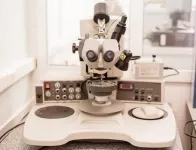Embed germ defence behaviours at home to reduce virus spread now and in the future - new study
University of Bath Press Release
2021-02-26
(Press-News.org) Whilst the nation has taken to washing its hands regularly since the start of the pandemic, other individual behaviours, such as cleaning and disinfecting surfaces or social distancing within the home, have proved harder to stick, say the researchers behind the behaviour change website 'Germ Defence'.
In their new study, published today (Friday 26 February 2021) in the Journal of Medical Internet Research, psychologists from the universities of Bath, Bristol and Southampton, warn of the continuing risks of household transmission of COVID-19 and the ongoing importance of breaking chains of transmission now and in the future.
Their research analysed user data of the website Germ Defence - a site which was developed by clinicians and scientists to increase awareness of infection control at home. Germ Defence was adapted with funding from UK Research and Innovation (UKRI) at the start of the pandemic to help in our response to COVID-19.
Germ Defence provides simple, tailored advice appropriate to people's different circumstances and helps people to use simple behaviour change techniques to reduce virus spread at home. This covers a variety of topics, such as the importance of opening windows to keep rooms well-ventilated, as well as reminders about cleaning surfaces and quarantining delivery packages. It has recently been updated with advice on keeping safe while attending vaccination appointments.
Previous research from the team has highlighted the effectiveness of Germ Defence techniques in working against respiratory infections., To date, the site has been accessed over half a million times, from users in over 150 countries.
Results from this work suggest Germ Defence has been effective in helping people improve their habits to reduce COVID-19 virus. However, findings also suggest that whilst most people have adhered to regular hand washing, other self-reported infection control behaviours are much lower than is optimal for infection prevention.
From their study sample (a self-selecting group that the researchers acknowledge is likely to be more motivated to improve their behaviour), they found the majority of users washed their hands 'very often', yet were much less likely to self-isolate or wear a facemask at home if they had symptoms.
Such actions remain critical says the lead author Dr Ben Ainsworth, from the University of Bath's Department of Psychology, and he hopes these findings can act as a reminder to us all that we need to embed these behaviours into our daily life to help reduce the spread. Longer-term, in a post-pandemic world, he emphasises that these behaviours will continue to remain important and could help to reduce the future spread of other infectious diseases, including seasonal flu.
He explains: "We know there are a number of simple precautions all of us can take which lower the chances of COVID-19 spreading within homes. Since the start of the pandemic and the increased focus on handwashing we know that some of these behaviours have stuck, yet others have proved much harder to catch on, not least ensuring that we socially-distance from other family members if we have symptoms or test positive.
"In spite of the current vaccine rollout and the recently-announced road map for unlocking, we have to continue to reduce infection spread and Germ Defence shows a powerful and simple way in which that can be done."
Professor Lucy Yardley from the University of Bristol adds: "Germ Defence was co-developed with members of the public to make it as accessible and helpful as possible. It has been translated into over 20 languages and is constantly updated by our expert team of clinicians, scientists and members of the public to ensure it is up to date with the latest evidence. We also have new information that can help people keep safe when attending their vaccination appointment, which for some people might be the first time out of the house for some time."
The researchers highlight that it is vital to address barriers that some people might face in engaging with infection control behaviours, in particular financial ones, where houses are high occupancy, or where individuals have caring responsibilities which can make infection control measures harder.
INFORMATION:
ELSE PRESS RELEASES FROM THIS DATE:
2021-02-26
Treating critically ill COVID-19 patients with drugs typically used for rheumatoid arthritis may significantly improve survival, a landmark study has found.
The findings, which were announced in January and have now been peer-reviewed and published in the New England Journal of Medicine, come from the REMAP-CAP trial, which evaluates the effect of treatments on a combination of survival and length of time patients need support in an intensive care unit (ICU).
Initial findings reported in November showed that tocilizumab, a drug used to treat arthritis, was likely to improve outcomes among critically ill COVID-19 ...
2021-02-25
Clinical research requires that data be mined for insights. Machine learning, which develops algorithms to find patterns, has difficulty doing this with data related to health records because this type of information is neither static nor regularly collected. A new study developed a transparent and reproducible machine learning tool to facilitate analysis of health information. The tool can be used in clinical forecasting, which can predict trends as well as outcomes in individual patients.
The study, by a researcher at Carnegie Mellon University (CMU), appears in Proceedings of Machine Learning Research.
"Temporal Learning Lite, or TL-Lite, is a visualization and forecasting tool to ...
2021-02-25
Physicists from Russia, Chile, Brazil, Spain, and the UK, have studied how the magnetic properties change in 3D nanowires, promising materials for various magnetic applications, depending on the shape of their cross-section. Particularly, they more deeply probed into the Walker breakdown phenomenon, on the understanding of which the success of the implementation of the future electronics devices depends. The research outcome appears in Scientific Reports.
The cross-sectional geometry of a three-dimensional nanowire affects the domain wall dynamics and therefore is crucial for their control. In turn, managing the DW dynamics under various external conditions is necessary in order to realize the future electronics and computing devices, operating on new physical principles. ...
2021-02-25
Born in food web ecology, the concept of trophic levels -- the hierarchy of who eats who in the natural world -- is an elegant way to understand how biomass and energy move through a natural system. It's only natural that the idea found its way into the realm of aquaculture, where marine and freshwater farmers try to maximize their product with efficient inputs.
"It's often used as a measure of how sustainable it is to harvest or consume that species," said Rich Cottrell(link is external), a postdoctoral researcher at UC Santa Barbara's National Center for Ecological Analysis & Synthesis (NCEAS). As plants (level 1) become food to plant eaters (level 2), who in turn are consumed by carnivores (level 3) and so on, the amount of energy ...
2021-02-25
Hypertrophic cardiomyopathy (HCM) is a cardiovascular disease characterized by thickening of the left ventricle, otherwise known as the main squeezing chamber of the heart. HCM is best known for causing sudden death in athletes but can occur in persons of any age, often without symptoms. While frequently discussed in the context of genetics, most patients with HCM do not have a known genetic variant. Investigators from Brigham and Women's Hospital uncovered a means to study the complexity of this disease beyond the identification of individual genes. This new approach offers a path toward treating HCM using individualized medicine. ...
2021-02-25
While protons populate the nucleus of every atom in the universe, sometimes they can be squeezed into a smaller size and slip out of the nucleus for a romp on their own. Observing these squeezed protons may offer unique insights into the particles that build our universe.
Now, researchers hunting for these squeezed protons at the U.S. Department of Energy's Thomas Jefferson National Accelerator Facility have come up empty handed, suggesting there's more to the phenomenon than first thought. The result was recently published in Physical Review Letters.
"We were looking to squeeze the proton such that its quarks are in a small-size configuration. And that's a pretty tough ...
2021-02-25
A University of Oklahoma-led study published in 2020 revealed that both area and plant growth of paddy rice is significantly related to the spatial-temporal dynamics of atmospheric methane concentration in monsoon Asia, where 87% of the world's paddy rice fields are situated. Now, the same international research team has released a follow-up discussion paper in the journal Nature Communications. In this paper, the team identifies the limits and insufficiency of the major greenhouse emission database (EDGAR) in estimating paddy rice methane emissions.
"Methane emission from paddy ...
2021-02-25
EL PASO, Texas - A study by physiology researchers at The University of Texas at El Paso found that El Paso's stay-at-home ordinance due to the COVID-19 pandemic had positive effects on the health and well-being of the region's residents.
Despite a shutdown of gyms and movement restrictions on non-essential activities, residents increased their fitness activity and closely monitored their food and nutrition intake, said Cory M. Smith, Ph.D., assistant professor of kinesiology in UTEP's College of Health Sciences and the study's principal investigator.
More than 1,300 El Paso and ...
2021-02-25
Researchers at the University of Maryland School of Medicine (UMSOM) co-authored a study, published today in the journal Science, that details the sequencing of 64 full human genomes. This reference data includes individuals from around the world and better captures the genetic diversity of the human species. Among other applications, the work will enable population-specific studies on genetic predispositions to human diseases as well as the discovery of more complex forms of genetic variation.
Twenty years ago this month, the International Human Genome Sequencing Consortium announced the first draft of the human genome reference sequence. The Human Genome Project, as it was called, required 11 years of work and involved more than 1000 ...
2021-02-25
Psychologists have long found that people behave differently than when they learn of peers' actions. A new study by computer scientists found that when individuals in an experiment about autonomous vehicles were informed that their peers were more likely to sacrifice their own safety to program their vehicle to hit a wall rather than hit pedestrians who were at risk, the percentage of individuals willing to sacrifice their own safety increased by approximately two-thirds.
As computer scientists train machines to act as people's agents in all sorts of situations, the study's authors indicate that the social component of decision-making is often overlooked. This could be of great consequence, note the paper's authors who show that the trolly problem -long shown to be ...
LAST 30 PRESS RELEASES:
[Press-News.org] Embed germ defence behaviours at home to reduce virus spread now and in the future - new study
University of Bath Press Release



